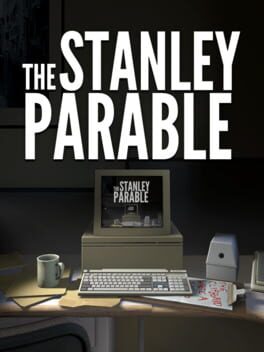It’s really hard to say anything new or interesting about a game that has been so discussed since it’s first release. I think that it’s intentions are pretty clear, and therefore you have two ways of understanding it’s goal: a. The game is either way too obvious about what it’s trying to do or b. The game should be celebrated for it’s clarity on communicating an idea. No matter which concepts we chose to express what it’s trying to do, whether we chose to consider it a critique of gaming industry, a reflection of the nature of gaming development and video-games itself, about the relation between the author and the player, about freedom as a whole: The point is that we all get it, we all know what’s going on here.
It was just a matter of time until videogames reach the moment in their history where they finally become meta. Velazquez did it on paintings; Shakespeare, Cervantes, and many others did it on literature; Orson Welles, Truffaut, Fellini and others did it on cinema; and, even if i suspect it wasn’t truly the first (don’t know, really), we can say that The Stanley Parable did it on videogames. My aforementioned examples on this subject might seem too academic but the truth is that during the last few decades, these concepts have been applied in mainstream media too. An example that comes to mind ws Wes Craven’s New Nightmare, and i’m pretty sure this happens more oftenly in comedy. So my point about saying that it was simply a matter of time until this happens in video-games, is to say that we, as avid media consumers, have been exposed to such ideas for years, and somehow, the logical conclussion is that somehow we should’ve become slightly desensitized to the surprise effect.
Yet, The Stanley Parable works. It doesn’t only works but is also an absolute masterpiece. And probably this works also because it’s not reliant on the surprise effect, considering that the trick is revealed pretty quickly. It’s comedic not just because of the joke but also because how much it overuses the same trick. In a way, The Stanley Parable is an exploration about how many times a joke can be told and still be funny. And of course, the existential dread is there. But in the end, which one weights more than the other, if the tragedy or the comedy, ends up being a subjective matter. And for me, it’s definitely the comedy.
It was just a matter of time until videogames reach the moment in their history where they finally become meta. Velazquez did it on paintings; Shakespeare, Cervantes, and many others did it on literature; Orson Welles, Truffaut, Fellini and others did it on cinema; and, even if i suspect it wasn’t truly the first (don’t know, really), we can say that The Stanley Parable did it on videogames. My aforementioned examples on this subject might seem too academic but the truth is that during the last few decades, these concepts have been applied in mainstream media too. An example that comes to mind ws Wes Craven’s New Nightmare, and i’m pretty sure this happens more oftenly in comedy. So my point about saying that it was simply a matter of time until this happens in video-games, is to say that we, as avid media consumers, have been exposed to such ideas for years, and somehow, the logical conclussion is that somehow we should’ve become slightly desensitized to the surprise effect.
Yet, The Stanley Parable works. It doesn’t only works but is also an absolute masterpiece. And probably this works also because it’s not reliant on the surprise effect, considering that the trick is revealed pretty quickly. It’s comedic not just because of the joke but also because how much it overuses the same trick. In a way, The Stanley Parable is an exploration about how many times a joke can be told and still be funny. And of course, the existential dread is there. But in the end, which one weights more than the other, if the tragedy or the comedy, ends up being a subjective matter. And for me, it’s definitely the comedy.

SugarKane21
11 months ago